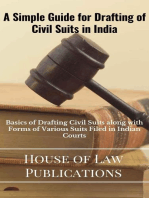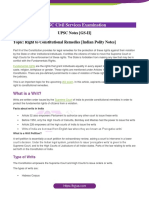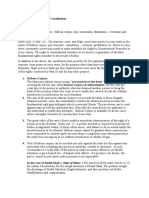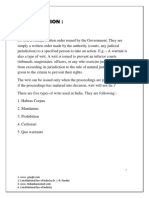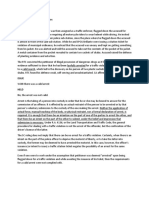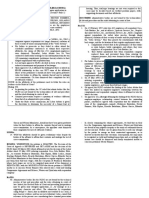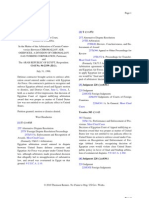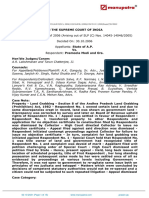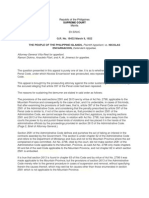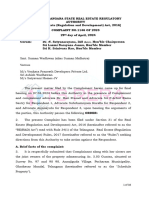Module 4
Uploaded by
khadija khanModule 4
Uploaded by
khadija khanModule 4
How to draft Writ Petitions.
Writ Petition is an order by a higher court to a lower court or courts, directing them to do
something or stop them from doing something. Writ is a form of written command in the name
of the court. It directs you to act in a specific way.
In the Indian legal system, you can file or draft a writ petition under Article 226 in the High
Court and under Article 32 of the Indian Constitution in the Supreme Court.
Type of Writs in the Constitution of India
The Indian Constitution gives the power to the Supreme Court, where it issues Writ Petitions in
India for the enforcement of any fundamental rights guaranteed under Article 32 of the Indian
Constitution.
The power to issue a writ petition in India is primarily a provision - to the Right of Constitutional
Remedies to every citizen and this right acts as a guarantor of all other fundamental rights in
India.
There are five writ petition types in the Indian constitution, which you can file either before the
High Court or Supreme Court such as:
Habeas Corpus
Mandamus
Prohibition
Certiorari
Quo Warranto
1. Habeas Corpus Writ Petition
INTERNATIONAL JOURNAL OF ADVANCED LEGAL RESEARCH
The literal meaning of the term Habeas Corpus means, ‘you may have the body of.’ You can file this
type of writ petition when a person is illegally detained. Meaning, if the court finds out that the
person is illegally detained, then it can order for the release of that person.
For Example:
When one files writ petitions of Habeas Corpus in nature, then the court orders the
authority to produce the detained person before him to examine whether he/she has been
examined legally or illegally
On conducting the examination, if the court finds that the person has been illegally
detained, it can order for the release of the person
The scope of habeas corpus writ petition has been widened by the Supreme Court. Now you can
also file it for the violation of fundamental rights of the prisoners ( eg: Sunil Batra vs. Delhi
Administration). The Supreme Court explains the meaning of the writ petition of Habeas Corpus
very well in the case of P.S. SADASHIV SWAMI vs. STATE OF TAMIL NADU (AIR 1974 SC 2271)[ 1].
Thus, the features of the writ petition are as follows:
Court has the authority to ask questions regarding the causes of detention of the detained
person
The court can issue a summon for the production of the detained person in the court
If it is concluded that the detention of the person is illegal, it can order for the release of
the person
One can file the writ petition of Habeas Corpus in any of the courts, be it High Court or the
Supreme Court. Also, one can issue it under the following circumstances where:
The person has been detained but has not been produced before the magistrate within 24
hours of arrest
The arrest has been made without any violation of law done by the person
The arrest has been made for an unconstitutional law i.e. a law against the provisions of
the Indian Constitution
Detention is done with malafide intent, or with the intent to harm the persons
INTERNATIONAL JOURNAL OF ADVANCED LEGAL RESEARCH
Who can file a writ of Habeas Corpus?
Generally, the person who is an illegal detainee files the writ of habeas corpus. To begin the writ
process for filing a petition of Habeas Corpus, one can file it and issue it against any public
authority or any particular individual. However, in certain cases, the court may allow other
people to file a writ of habeas corpus on behalf of the detained person, who is their friend or
relative.
2. Writ of Mandamus
Mandamus is a Latin word meaning ‘we command’. Mandamus is a court writ whereby the higher
courts orders the lower court, tribunal, forum or any other public authority to do any act which
otherwise also falls under the purview of their duty.
The court laid down the following requirements of the writ of mandamus:
There should be a legal right in existence
The legal right should be enforceable by the court
Enforcement of such a right must impose a responsibility of per on a person, public
authority, corporation or government
Such duty is of public nature
Writ of mandamus can be issued against the following :
An individual or a private body
If the duty which is the subject matter is discretionary and not mandatory
It can be issued against the president or the governor of the state
Against an acting chief justice
To enforce a private contract
Who can file the Writ of Mandamus?
Any person - be it an individual or a private body can file for the court petition under the writ of
mandamus, so long as they have legal rights in the concerned matter to do so.
INTERNATIONAL JOURNAL OF ADVANCED LEGAL RESEARCH
3. Writ of Prohibition
As the name suggests, the writ of prohibition is a court petition issued either by the Supreme
Court or High Court to prohibit.
Prohibition writ for the court is issued to stop or put a stay on the power exercised by the
authority and is commonly known as stay order. In India, a writ petition is issued against the
proceedings going on in lower courts and in such proceeding, the lower court is exceeding its
powers. Once the writ of prohibition is allowed either by the Supreme Court or in High Court the
proceedings of the lower court come to an end.
The Supreme Court in the case of GOVIND MENON vs. UOI (AIR 1967 SC 1893)[ 3] laid down the
conditions in which one can issue the writ of prohibition. The conditions by the court are:
When there is an excess of jurisdiction, or
When there is an absence of jurisdiction.
4. Writ of Certiorari
In the literal sense, the word certiorari means, ‘to be certified’. One can issue the writ of certiorari
by the Apex court for transfer of the matter to it or any superior authority for proper
consideration. You can issue the writ of certiorari against the inferior court or tribunal. (eg: a high
court writ petition can be issued against lower district courts)
In simple terms, one can issue the writ of certiorari when the subordinate courts or the quasi-
judicial bodies act in:
The absence of their jurisdiction, or
Exceeds their jurisdiction or
Fails to make use of their jurisdiction
In the case of STATE OF UP vs MOHAMMED NOOR (AIR 1958 SC 816)[ 4], the supreme court stated that
one can issue the writ of certiorari. To mainly reform the jurisdiction-related mistakes of the
inferior court or tribunal.
INTERNATIONAL JOURNAL OF ADVANCED LEGAL RESEARCH
Subsequently, in another judgment of HARI VISHNU KAMATH vs. AHMED ISHAQ (AIR 1995 SC 233)[ 5].
The Supreme Court held that one can only issue the writ of certiorari to correct the errors
apparent on the face of records, but not for the correction of an error of fact.
The Essential Condition for Writ of Certiorari:
There should be court, tribunal or an officer having the legal authority to determine the
question with a duty to act judicially
Such a court, tribunal or officer must have passed an order acting without jurisdiction. Or
in excess of the judicial authority vested by law in such court, tribunal or officer.
The order could also be against the principles of natural justice. Or the order could
contain an error of judgment in appreciating the facts of the case
5. Writ of Quo-Warranto
Writ of quo warranto means a writ that you can be issued to restrain a person from acting in the
capacity of public office to which he/she does not have the entitlement. Here, the term Quo-
Warranto means, ‘by what authority’ or, ‘on whose authority is one holding a public office’.
For example:
There is a vacancy in the government and by giving a job to a 63-year-old person, they
fill that vacancy
But since, the retirement age is 60 years, so in this case, one can file a writ of quo-
warranto to remove such person from the public office
The supreme court in the case of UNIVERSITY OF MYSORE vs. GOVIND RAO[ 6] laid down the
requirements of the petition of quo-warranto which are as follows:
A disputed post must be the public post
The post should be held by the person without any legal authority
The office must be a substantive one and not merely the function or employment of a
servant at the will and during the pleasure of another.
INTERNATIONAL JOURNAL OF ADVANCED LEGAL RESEARCH
How to draft a petition?
General Title of petition “In the High Court of Gujarat At Ahmedabad” INDEX
List of Events
Title of the Petition “In The High Court of_______ at________”
“District” is relevant to ascertain the fact from which district the case has come to the high
court-service of court process is done through the District Court- the reference of the district
would also help the Registry of the High Court in finding out whether there is any caveat against
a particular decision.
Nature of proceeding: Special Civil Application
No:______ of 2016, Writ Petition (PIL) No:______ of 2016 or Special Criminal Application
No:_____ of 2016
In the matter of :
i) Articles of the Constitution of India
ii) Relevant laws to be stated
iii) Relevant rules to be stated
iv) The decision under challenge in the petition
The part is very relevant for deciding before which bench the case will be listed. You as a lawyer
can do some planning in deciding this part within the framework of law.
Details of petitioners:
1. i) Individual petition [CPC O.1 R.1]
2. ii) Petitioner by more than one person [ CPC O.1 R.1]
Chandubhai Patel v. State of Gujarat 1975 GLR 368,
INTERNATIONAL JOURNAL OF ADVANCED LEGAL RESEARCH
Umesh Chand v. State of UP AIR 1984 ALL 46(FB)
3. iii) Petitioner by partnership firm or a proprietary firm or
HUF [O.30 R. 1,10]
4. iv) Petitioner by Company, Association person or
Cooperative Society [ CPC O. 29]
5. v) Petitioner by Trust or other Society [ CPC O.31]
6. vi) Suit by or against minor or unsound person [CPC O.32]
7. vii) Petition in representative capacity [ CPC O.1. R.8, Rule
175 GHC Rules,1993] A separate application to be
filed.
8. viii) Intervention application [ CPC O.1 R.8A]
Details of respondents:
i) The State Government or Central Government as the case may be is required to be joined as
respondent no: 1 usually.
The description of the State Government should be for example “The State of Gujarat”.
The description of the Central Government should be “The Union of India”. This description is
sufficient under Section 79 of the Code of Civil Procedure Code. [Refer to also O.27 and O.27A
of CPC]
The litigants are not supposed to know the department which is concerned with the case. A
copy of the petition to be served upon the Government Pleader or the Central Government
Counsel as the case may be.
When writ in the nature of Mandamus is prayed for, the concerned authority or officer is also
required to be joined as a respondent.
INTERNATIONAL JOURNAL OF ADVANCED LEGAL RESEARCH
When writ in the nature of certiorari or prohibition is prayed for, the authority or tribunal
is required to be joined as a respondent. [now in view of the judgement of SC in Sh.
JogendrasinhjiVijaysinhji v. State of Gujarat (2015) 9 SCC 1 and M.S.Kazi v. Muslim
Education Society, SC Judgment dated 22/8/2016 (para 8,9) the tribunal is not required to
be joined as party respondent]
When writ in the nature of Habeas Corpus is prayed for, the person who has
illegally confined the person is required to be joined as a respondent.
When writ in the nature of Quo Warranto is prayed for, the person who has usurped
the public office is required to be joined as a respondent.
Where allegations of mala-fide are made against any officer or person, such a
person or officer is also required to be joined as a respondent.
To,
Hon’ble Chief Justice and other Hon’ble Judges Of The High Court of________
The petitioner(s) most respectfully submit(s):
1. Challenge in the petition
2. Facts to be divided in to small sub-paragraphs- if violation of the fundamental right given
to citizens of India only is alleged- make statement that the petitioner is a citizen of India.
3. Legal Grounds/Submissions
4. Prima facie case, balance of convenience and irreparable loss
5. No other alternative remedy
6. Details of the legal proceeding, if already undertaken on the subject- Statement to be
made that no other case filed on the subject matter in any other forum and how it was
disposed of. [Rule 174 GHC Rules,1993]
7. No delay and laches/ Give reasons for delay-details of the cause of action
8. Statement about territorial jurisdiction only when there is any doubt about the High
Court’s jurisdiction
9. Prayer clause
INTERNATIONAL JOURNAL OF ADVANCED LEGAL RESEARCH
10. Affidavit- Oath/affirmation-facts based on the personalknowledge, facts based on
information and belief – no material factor document concealed.
11. Documents-Annexures ( Annexures to the petition should be given consecutive cardinal
numbers prefixed by word ”P” as P-1, P- 2,...., annexures to the reply should be given cardinal
numbers prefixed by the word ”R” as R-1, R-2..... and annexures to rejoinder should be given
cardinal numbers prefixed by the word “RJ” as RJ-1, RJ-2 ....)
12. The Gujarat High Court Rules, 1993 Chapter XVII Rule 174 to 194 for petition under Article
226 and 227 and Chapter XXVIII Rules 378 to 386 (Petition for Habeas Corpus)
Broad analysis of Article 226 and Article 227:
Article 226 is invoked for the enforcement of the fundamental rights; or
For seeking judicial review; or
For enforcing the rule of law in all governmental actions.Article 227 can be invoked
against judicial orders of subordinate courts and tribunals- for correcting jurisdictional errors
only-power of superintendence- no other
Difference between plaint and petition:
Civil Procedure Code does not apply to petition under Article 226/227 of the Constitution
of India [Refer to S.141 CPC]
Civil Procedure code serves as a guide (State of Punjab Vrs. Puran Singh AIR 1996 SC
1092).
Pleading and Plaint are governed by Order VI and Order VII of the Code of Civil
Procedure. Your petition must also be in tune with these rules not strictly but as far as possible.
In the petition before high court you are entitled to quote the relevant statutory provision,
extract from relevant case law, legal submissions etc. which is not permitted in drafting a plaint.
INTERNATIONAL JOURNAL OF ADVANCED LEGAL RESEARCH
Sample Draft
SYNOPSIS
1. The Petitioners are filing the present Writ Petition under Article 226
of the Constitution of India Praying inter alia for issuing Writ of
Mandamus and other appropriate Writ for directing the Respondent No.
1 to Release Respondent No. 4 from the premises of Respondent No.
5, seeking direction to Respondent No. 1 inquire into the incident of
keeping Respondent No.4 in confinement by Respondent No. 5 in an
illegal building without basic amenities and in un healthy conditions,
conduct proper medical tests on Respondent No. 4 and also seeking
Direction to Respondent No. 4 to take care of ailing Petitioners at their
old age and provide maintenance to them under Section 4 of
Maintenance of Parents and Senior Citizens Act 2007.
2. That the petitioners are Senior Citizens aged __ and __ years and
Parents of Respondent No.4, _____________, who has been staying in
the Premises of Respondent No. 5 ______________________ since
July 20__. The Petitioners being senior citizens need the support of
Respondent No. 4 to take care of their health, necessities etc.
3. That the Petitioners have strong doubts on the Respondent No. 5
kept their Respondent No. 4 under the influence of drugs or any other
substance.
4. That Respondent No. 4 is an Engineer and was earning Rs. 24 Lakh
a year and when she joined Respondent No.5. The Petitioners have
strong doubt that Respondent No. 5 has trapped her for the sake of
bank deposit.
5. That the Respondent No. 4 categorically told on ______ through
phone that she is not interested to talk to the Petitioners as they are
not left hope on her and continuously raising the issue in Court,
government authorities, Media and Police stations.
6. That as per Section 4 of the Maintenance and Welfare of Parents
INTERNATIONAL JOURNAL OF ADVANCED LEGAL RESEARCH
and Senior Citizens Act, 2007, the Children are obliged to maintain a
senior citizen to the needs of such citizen so that senior citizen may
lead a normal life.
7. That as per Section 5 of the Maintenance and Welfare of Parents
and Senior Citizens Act, 2007 the Application for maintenance should
be filed in Tribunal, but due to the Peculiar situation in this matter, as
the Respondent No. 4 is confined in the Ashram of Respondent No.5,
the Petitioners are approaching this Hon'ble Court for Justice.
LIST OF DATES AND EVENTS
2016 Respondent No.4 stayed and studied Masters in Commerce. She
started working for an approximate salary package of Rs. 24 lakhs a
year.
July 2016 Respondent No.4 came back to India and started staying in
without intimating her parents.
2016-19 Petitioner No.2 made several complaints to Police and
government authorities for return of their daughter. But there was no
action on the part of the authorities.
15.1.20__ Respondent No.4 categorically told to the Petitioners on
Mobile phone that she is not willing to meet or talk to them as they are
continuously maligning the Respondents No. 5 by making complaints
to Police and approaching Media. She has told to the Petitioners that
since this Hon'ble court expressed helplessness in the pending PIL,
nothing will happen to the Respondents No. 5.
__.02.20__ Hence the instant Writ Petition
IN THE HIGH COURT OF DELHI AT NEW DELHI
CIVIL ORIGINAL JURISDICTION
WRIT PETITION (CIVIL) NO. OF 2020
INTERNATIONAL JOURNAL OF ADVANCED LEGAL RESEARCH
IN THE MATTER OF:
ABC ... PETITIONERS
VERSUS
XYZ ... RESPONDENTS
WRIT PETITION UNDER ARTICLE 226 OF THE CONSTITUTION
OF INDIA PRAYING INTER ALIA FOR ISSUING WRIT OF
MANDAMUS AND OTHER APPROPRIATE WRIT FOR DIRECTING
THE RESPONDENT NO. 1 TO RELEASE RESPONDENT NO. 4 FROM
THE PREMISES OF RESPONDENT NO. 5, SEEKING DIRECTION
TO RESPONDENT NO. 1 INQUIRE INTO THE INCIDENT OF
KEEPING RESPONDENT NO.4 IN CONFINEMENT BY
RESPONDENT NO. 5 IN AN ILLEGAL BUILDING WITHOUT BASIC
AMENITIES AND IN UN HEALTHY CONDITIONS, CONDUCT
PROPER MEDICAL TESTS ON RESPONDENT NO. 4 AND ALSO
SEEKING DIRECTION TO RESPONDENT NO. 4 TO TAKE CARE OF
AILING PETITIONERS AT THEIR OLD AGE AND PROVIDE
MAINTENANCE TO THEM UNDER SECTION 4 OF MAINTENANCE
OF PARENTS AND SENIOR CITIZENS ACT 2007.
To,
The Hon'ble Chief Justice of High Court,
And His Companion Judges of the
Hon'ble High Court of Delhi.
The humble petition of the
Petitioner above named.
MOST RESPECTFULLY SHOWETH:
1. The Petitioners are filing the present Writ Petition under Article 226
of the Constitution of India Praying inter alia for issuing Writ of
Mandamus and other appropriate Writ for directing the Respondent No.
1 to Release Respondent No. 4 from the premises of Respondent No.
INTERNATIONAL JOURNAL OF ADVANCED LEGAL RESEARCH
5, seeking direction to Respondent No. 1 inquire into the incident of
keeping Respondent No.4 in confinement by Respondent No. 5 in an
illegal building without basic amenities and in un healthy conditions,
conduct proper medical tests on Respondent No. 4 and also seeking
Direction to Respondent No. 4 to take care of ailing Petitioners at their
old age and provide maintenance to them under Section 4 of
Maintenance of Parents and Senior Citizens Act 2007.
2. That Petitioner No. 1 is __ years old mother of Respondent No.4 and
is a House wife.
3. That Petitioner No. 2 is father of Respondent No. 4 and he is __
years old.
4. That Respondent No. 4, is the daughter of Petitioner No. 1 and 2.
5. That the Petitioners being retired senior citizens need the support of
their daughter as they do not have sons, no other person, to take care
of their health, necessities etc. Petitioner No. 1 is suffering from
various ailments like joints pain on legs, tooth pain which require root
canal treatment and other old age problems. Petitioner No.2 is facing
high blood pressure, heart related health issues and he requires
regular medical check-up. The Petitioners are running pillar to post to
get their constitutional rights. They have approached Delhi Police and
Central Government to handover their daughter to them, but no action
has been taken by the authorities against the Respondent No. 5, to
release their daughter.
6. That the Petitioners have strong doubts on Respondent No. 5, that
his team kept their daughter under the influence of drugs or any other
substance.
7. It is submitted that the Petitioners have only one daughter
Respondent No. 4 is living in the premises of Respondent No. 5 in
Delhi, India and she deserted her senior citizen parents at their old
age.
8. That as per Section 4 of the Maintenance and Welfare of Parents
and Senior Citizens Act, 2007 the Children are obliged to maintain a
INTERNATIONAL JOURNAL OF ADVANCED LEGAL RESEARCH
senior citizen to the needs of such citizen so that senior citizen may
lead a normal life. Extracts of Section 4 of the Act is as under:
"4. Maintenance of parents and senior citizens.-(1) A senior citizen
including parent who is unable to maintain himself from his own
earning or out of the property owned by him, shall be entitled to make
an application under section 5 in case of-
(i) parent or grand-parent, against one or more of his children not
being a minor;
(ii) a childless senior citizen, against such of his relative referred to in
clause (g) of section 2.
(2) The obligation of the children or relative, as the case may be, to
maintain a senior citizen extends to the needs of such citizen so that
senior citizen may lead a normal life.
(3) The obligation of the children to maintain his or her parent extends
to the needs of such parent either father or mother or both, as the
case may be, so that such parent may lead a normal life.
(4) Any person being a relative of a senior citizen and having sufficient
means shall maintain such senior citizen provided he is in possession
of the property of such citizen or he would inherit the property of such
senior citizen:
Provided that where more than one relatives are entitled to inherit the
property of a senior citizen, the maintenance shall be payable by such
relative in the proportion in which they would inherit his property."
True copy of the Maintenance and Welfare of Parents and Senior
Citizens Act, 2007 is annexed herewith and marked as Annexure P-1.
INTERNATIONAL JOURNAL OF ADVANCED LEGAL RESEARCH
9. That as per Section 5 of the Maintenance and Welfare of Parents
and Senior Citizens Act, 2007 the Application for maintenance should
be file in Tribunal, but due to the Peculiar circumstances in this matter
as the Respondent No.4 is confined in the Building of Respondent No.
5 the Petitioners are approaching this Hon'ble Court for Justice.
10. That on April ____ the Petitioners filed complaint with Station
House Officer, Police Station ___________ New Delhi requesting
appropriate action in securing their daughter safely from the centre.
Copy of the letter dated April 1, 2016 sent by the Petitioners to SHO,
___________ Police Station is annexed herewith and marked
as Annexure P-2.
11. That on April _____the Petitioners wrote to the Delhi Commission
for women, ITO, New Delhi requesting them to take appropriate action
in securing their daughter safely from the centre and help in restoring
peace to the family on humanitarian ground. Copy of the letter dated
April ____ sent by the Petitioner to Delhi Commission for Women is
annexed herewith and marked as Annexure P-3.
12. That Respondent No. 3 not yet arrested Respondent No. 5 against
whom several serious criminal cases are registered by CBI. The
Financial transactions of Respondent No. 5 are also needs to be
verified by a competent authority. Because even after the hiding of
founder of the Respondent No. 5, it has been running un interruptedly
in an illegal/un authorised building and getting all kind of financial,
strategic support.
13. That being aggrieved, the Petitioner has no other alternative
remedy but to approach this Hon'ble Court and invoke Article 226 of
the Constitution of India on the following amongst other grounds which
are urged hereinafter without prejudice to each other.
GROUNDS
INTERNATIONAL JOURNAL OF ADVANCED LEGAL RESEARCH
That the present Writ Petition is being filed on the following, amongst
other, grounds without prejudice to each other;
A. Because the Petitioners being retired/ senior citizens need the
support of their daughter as they do not have sons and no other
person to take care of their health, necessities etc. The Petitioners are
running pillar to post to get their constitutional rights. They have
approached Delhi Police and Central Government to handover their
daughter to them, but no action has been taken by the authorities
against Respondent No. 5 to release their daughter.
B. Because the Petitioners have strong doubts on Respondent No. 5
kept their daughter under the influence of drugs or any other
substance.
C. Because the Petitioners have only one daughter, Respondent No. 4
is living in the Ashram and she deserted her senior citizen parents. The
Petitioners have no other close relatives to look after them.
D. Because as per Section 5 of the Maintenance and Welfare of Parents
and Senior Citizens Act, 2007 the Application for maintenance should
be file in Tribunal, but due to the Peculiar situation in this matter as
the Respondent No. 4 is confined in the Ashram of Respondent No. 6
the Petitioners are approaching this Hon'ble Court for Justice.
14. That the Petitioners have no other efficacious remedy except to
approach this Hon'ble Court by way of this Petition under Article 226 of
the Constitution of India.
15. That the Petitioners have not filed any other petition, claim, suit or
preceding in any court or tribunal throughout the territory of India
regarding the matter in dispute.
INTERNATIONAL JOURNAL OF ADVANCED LEGAL RESEARCH
PRAYERS
In view of the facts & circumstances stated above, it is most
respectfully prayed that this Hon'ble Court may be pleased to:-
a) Issue a Writ of Mandamus or any other appropriate Writ to
Respondent No. 1 to immediately release of Respondent No. 4,
daughter of Petitioners from the custody of Respondent No. 5;
b) Issue an appropriate Writ to the Respondent No. 4 to take care of
her ailing parents, give maintenance to them as per Section 4 of
Maintenance of Parents and Senior Citizens Act 2007;
c) Any other relief, order or direction this court may deem fit and
proper under the facts and circumstances of this case.
AND FOR THIS ACT OF KINDNESS THE PETITIONER AS DUTY
BOUND SHALL EVERY PRAY.
THROUGH
ADVOCATES FOR THE PETITIONERS
NEW DELHI
DATE:
INTERNATIONAL JOURNAL OF ADVANCED LEGAL RESEARCH
You might also like
- The Book of Writs - With Sample Writs of Quo Warranto, Habeas Corpus, Mandamus, Certiorari, and ProhibitionFrom EverandThe Book of Writs - With Sample Writs of Quo Warranto, Habeas Corpus, Mandamus, Certiorari, and Prohibition5/5 (11)
- Writ Petitions in India and How To File Them - IpleadersNo ratings yetWrit Petitions in India and How To File Them - Ipleaders18 pages
- Writ - Types of Writ: by A. Lakshminarayanan AdvocateNo ratings yetWrit - Types of Writ: by A. Lakshminarayanan Advocate20 pages
- Explain Mechanism of Writ and Its Types in Indian Legal SystemNo ratings yetExplain Mechanism of Writ and Its Types in Indian Legal System3 pages
- What Is A Writ and What Is A Writ Petition?: Types of Writs Habeas CorpusNo ratings yetWhat Is A Writ and What Is A Writ Petition?: Types of Writs Habeas Corpus2 pages
- Right To Constitutional Remedies Indian Polity NotesNo ratings yetRight To Constitutional Remedies Indian Polity Notes3 pages
- Explain Mechanism of Writ and Its Types in Indian Legal SystemNo ratings yetExplain Mechanism of Writ and Its Types in Indian Legal System3 pages
- B.B.A., L.L.B (Hons.) / Third Trimester-March 2017 Final Draft Constitutional Law - I Research Project Topic: "ARTICLE 32 & 226"No ratings yetB.B.A., L.L.B (Hons.) / Third Trimester-March 2017 Final Draft Constitutional Law - I Research Project Topic: "ARTICLE 32 & 226"17 pages
- What Is Writ?: Types of Writs - What Are Writs? - Indian Polity NotesNo ratings yetWhat Is Writ?: Types of Writs - What Are Writs? - Indian Polity Notes4 pages
- Constitutional Remedies: Orissa Review January - 2007No ratings yetConstitutional Remedies: Orissa Review January - 20073 pages
- HIGHT COURT JURISDICTION UNDER CONSTITUTION (2)No ratings yetHIGHT COURT JURISDICTION UNDER CONSTITUTION (2)9 pages
- Types of Writs:: Writs Under The Constitution OfindiaNo ratings yetTypes of Writs:: Writs Under The Constitution Ofindia4 pages
- Blog Ipleaders in Writ Jurisdiction of Supreme CourtNo ratings yetBlog Ipleaders in Writ Jurisdiction of Supreme Court8 pages
- 5 Types of Writs in Indian ConstitutionNo ratings yet5 Types of Writs in Indian Constitution14 pages
- Meaning of Anti - Competitive AgreementsNo ratings yetMeaning of Anti - Competitive Agreements14 pages
- Kunal Kumar Ballb 2 Roll No. 48 Criminal Law: NdyearNo ratings yetKunal Kumar Ballb 2 Roll No. 48 Criminal Law: Ndyear11 pages
- Topic: Criminal Liability of Artificial Intelligence.: Ilma Khan Roll No: 39 B.A.LLB 2 Year Criminal LawNo ratings yetTopic: Criminal Liability of Artificial Intelligence.: Ilma Khan Roll No: 39 B.A.LLB 2 Year Criminal Law13 pages
- First Cut-Off List (28.06.2019 - 01.07.2019) (Except Sunday) Admission To Undergraduate Programme 2019-2020 Hindu College, University of DelhiNo ratings yetFirst Cut-Off List (28.06.2019 - 01.07.2019) (Except Sunday) Admission To Undergraduate Programme 2019-2020 Hindu College, University of Delhi1 page
- E.K. Chandrasenan ETC ETC v. State of Kerala, 1955 AIR 1066 SCC (2) 99No ratings yetE.K. Chandrasenan ETC ETC v. State of Kerala, 1955 AIR 1066 SCC (2) 992 pages
- Ilma Khan Roll No:39 Ba - LL.B Law of TortsNo ratings yetIlma Khan Roll No:39 Ba - LL.B Law of Torts11 pages
- Ashwin Jha B.A.LL.B VTH Semester International LawNo ratings yetAshwin Jha B.A.LL.B VTH Semester International Law4 pages
- N Unfair Trade Practice Is Defined Under Section 2No ratings yetN Unfair Trade Practice Is Defined Under Section 22 pages
- Emergency Provisions in Indian Constitution Notes PDF: For UPSC, Banking & SSC ExamsNo ratings yetEmergency Provisions in Indian Constitution Notes PDF: For UPSC, Banking & SSC Exams5 pages
- Shapiro v. Judges of The Virginia Beach, 4th Cir. (2010)No ratings yetShapiro v. Judges of The Virginia Beach, 4th Cir. (2010)3 pages
- Sayson Vs CA, 205 SCRA 321, GR No. 89224-25, January 23, 1992No ratings yetSayson Vs CA, 205 SCRA 321, GR No. 89224-25, January 23, 19923 pages
- Hs Bedi Vs National Highway Authority of ... On 22 January, 2016-FALSE-CLAIM-SCINo ratings yetHs Bedi Vs National Highway Authority of ... On 22 January, 2016-FALSE-CLAIM-SCI94 pages
- Rubenstein v. United States, 214 F.2d 667, 10th Cir. (1954)No ratings yetRubenstein v. United States, 214 F.2d 667, 10th Cir. (1954)4 pages
- People v. Masterson 05/03/22: Petition AnswerNo ratings yetPeople v. Masterson 05/03/22: Petition Answer43 pages
- State of AP Vs Prameela Modi and Ors 30102006 SS060831COM36925No ratings yetState of AP Vs Prameela Modi and Ors 30102006 SS060831COM3692515 pages
- EX PARTE CARTY, Tex - Court of Criminal Appeals 2015 - Google ScholarNo ratings yetEX PARTE CARTY, Tex - Court of Criminal Appeals 2015 - Google Scholar4 pages
- Gilat Satellite Network LTD vs. UCPB General Insurance Co. G.R. No. 189563No ratings yetGilat Satellite Network LTD vs. UCPB General Insurance Co. G.R. No. 1895638 pages
- Cade Cothren Motion For Cameron Sexton's CommunicationsNo ratings yetCade Cothren Motion For Cameron Sexton's Communications13 pages
- The Book of Writs - With Sample Writs of Quo Warranto, Habeas Corpus, Mandamus, Certiorari, and ProhibitionFrom EverandThe Book of Writs - With Sample Writs of Quo Warranto, Habeas Corpus, Mandamus, Certiorari, and Prohibition
- Simple Guide for Drafting of Civil Suits in IndiaFrom EverandSimple Guide for Drafting of Civil Suits in India
- Writ Petitions in India and How To File Them - IpleadersWrit Petitions in India and How To File Them - Ipleaders
- Writ - Types of Writ: by A. Lakshminarayanan AdvocateWrit - Types of Writ: by A. Lakshminarayanan Advocate
- Explain Mechanism of Writ and Its Types in Indian Legal SystemExplain Mechanism of Writ and Its Types in Indian Legal System
- What Is A Writ and What Is A Writ Petition?: Types of Writs Habeas CorpusWhat Is A Writ and What Is A Writ Petition?: Types of Writs Habeas Corpus
- Right To Constitutional Remedies Indian Polity NotesRight To Constitutional Remedies Indian Polity Notes
- Explain Mechanism of Writ and Its Types in Indian Legal SystemExplain Mechanism of Writ and Its Types in Indian Legal System
- B.B.A., L.L.B (Hons.) / Third Trimester-March 2017 Final Draft Constitutional Law - I Research Project Topic: "ARTICLE 32 & 226"B.B.A., L.L.B (Hons.) / Third Trimester-March 2017 Final Draft Constitutional Law - I Research Project Topic: "ARTICLE 32 & 226"
- What Is Writ?: Types of Writs - What Are Writs? - Indian Polity NotesWhat Is Writ?: Types of Writs - What Are Writs? - Indian Polity Notes
- Constitutional Remedies: Orissa Review January - 2007Constitutional Remedies: Orissa Review January - 2007
- Types of Writs:: Writs Under The Constitution OfindiaTypes of Writs:: Writs Under The Constitution Ofindia
- Blog Ipleaders in Writ Jurisdiction of Supreme CourtBlog Ipleaders in Writ Jurisdiction of Supreme Court
- Kunal Kumar Ballb 2 Roll No. 48 Criminal Law: NdyearKunal Kumar Ballb 2 Roll No. 48 Criminal Law: Ndyear
- Topic: Criminal Liability of Artificial Intelligence.: Ilma Khan Roll No: 39 B.A.LLB 2 Year Criminal LawTopic: Criminal Liability of Artificial Intelligence.: Ilma Khan Roll No: 39 B.A.LLB 2 Year Criminal Law
- First Cut-Off List (28.06.2019 - 01.07.2019) (Except Sunday) Admission To Undergraduate Programme 2019-2020 Hindu College, University of DelhiFirst Cut-Off List (28.06.2019 - 01.07.2019) (Except Sunday) Admission To Undergraduate Programme 2019-2020 Hindu College, University of Delhi
- E.K. Chandrasenan ETC ETC v. State of Kerala, 1955 AIR 1066 SCC (2) 99E.K. Chandrasenan ETC ETC v. State of Kerala, 1955 AIR 1066 SCC (2) 99
- Ashwin Jha B.A.LL.B VTH Semester International LawAshwin Jha B.A.LL.B VTH Semester International Law
- N Unfair Trade Practice Is Defined Under Section 2N Unfair Trade Practice Is Defined Under Section 2
- Emergency Provisions in Indian Constitution Notes PDF: For UPSC, Banking & SSC ExamsEmergency Provisions in Indian Constitution Notes PDF: For UPSC, Banking & SSC Exams
- Shapiro v. Judges of The Virginia Beach, 4th Cir. (2010)Shapiro v. Judges of The Virginia Beach, 4th Cir. (2010)
- Sayson Vs CA, 205 SCRA 321, GR No. 89224-25, January 23, 1992Sayson Vs CA, 205 SCRA 321, GR No. 89224-25, January 23, 1992
- Hs Bedi Vs National Highway Authority of ... On 22 January, 2016-FALSE-CLAIM-SCIHs Bedi Vs National Highway Authority of ... On 22 January, 2016-FALSE-CLAIM-SCI
- Rubenstein v. United States, 214 F.2d 667, 10th Cir. (1954)Rubenstein v. United States, 214 F.2d 667, 10th Cir. (1954)
- State of AP Vs Prameela Modi and Ors 30102006 SS060831COM36925State of AP Vs Prameela Modi and Ors 30102006 SS060831COM36925
- EX PARTE CARTY, Tex - Court of Criminal Appeals 2015 - Google ScholarEX PARTE CARTY, Tex - Court of Criminal Appeals 2015 - Google Scholar
- Gilat Satellite Network LTD vs. UCPB General Insurance Co. G.R. No. 189563Gilat Satellite Network LTD vs. UCPB General Insurance Co. G.R. No. 189563
- Cade Cothren Motion For Cameron Sexton's CommunicationsCade Cothren Motion For Cameron Sexton's Communications



